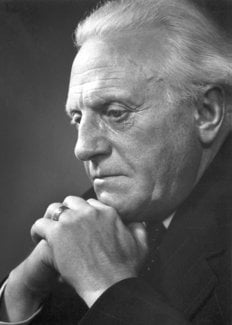Pär Lagerkvist
Biographical

Pär Lagerkvist (1891-1974), son of station master Anders Johan Lagerkvist and Johanna Blad, was born in the south of Sweden. He decided early that he was going to be a writer and, after a year at the University of Uppsala, he left for Paris (1913), where he came under the influence of expressionism, especially in painting. His impressions resulted in the programmatic Ordkonst och bildkonst (1913) [Verbal Art and Pictorial Art]. Until 1930 Lagerkvist lived chiefly in France and Italy, and even after his permanent return to Sweden he frequently travelled on the Continent and in the Mediterranean.
Lagerkvist has given an account of his early years in the autobiographical volumes Gäst hos verkligheten (1925) [Guest of Reality] and Det besegrade livet (1927) [The Conquered Life]. His poetry moves from the anxiety and despair of the war years, as in Ångest (1916) [Anguish], to the celebration of love as a «universal conciliatory power», as in Hjärtats sånger (1926) [Songs from the Heart].
As a playwright, Lagerkvist has been extremely versatile. While Den svåra stunden (1918) [The Difficult Hour I, II, III] shows the influence of the later Strindberg, plays like Himlens Hemlighet (1919) [The Secret of Heaven] echo Tagore and the mystery play; Han som fick leva om sitt liv (1928) [He Who Lived His Life Over Again], on the other hand, is realistic. His work during the thirties was determined by his violent opposition to totalitarianism: Bödeln (1933) [The Hangman], Mannen utan själ (1936) [The Man without a Soul], and Seger i mörker (1939) [Victory in the Darkness].
Lagerkvist increasingly has dealt with the problem of man’s relation to God, particularly in his three important novels, Dvärgen (1944) [The Dwarf], Barabbas (1950), and Sibyllan (1956) [The Sibyl]. Barabbas, the story of a «believer without faith», was his first truly international success.
In 1940, Lagerkvist was elected to the Swedish Academy.
This autobiography/biography was written at the time of the award and first published in the book series Les Prix Nobel. It was later edited and republished in Nobel Lectures. To cite this document, always state the source as shown above.
Pär Lagerkvist died on July 11, 1974.
Nobel Prizes and laureates
Six prizes were awarded for achievements that have conferred the greatest benefit to humankind. The 14 laureates' work and discoveries range from quantum tunnelling to promoting democratic rights.
See them all presented here.
